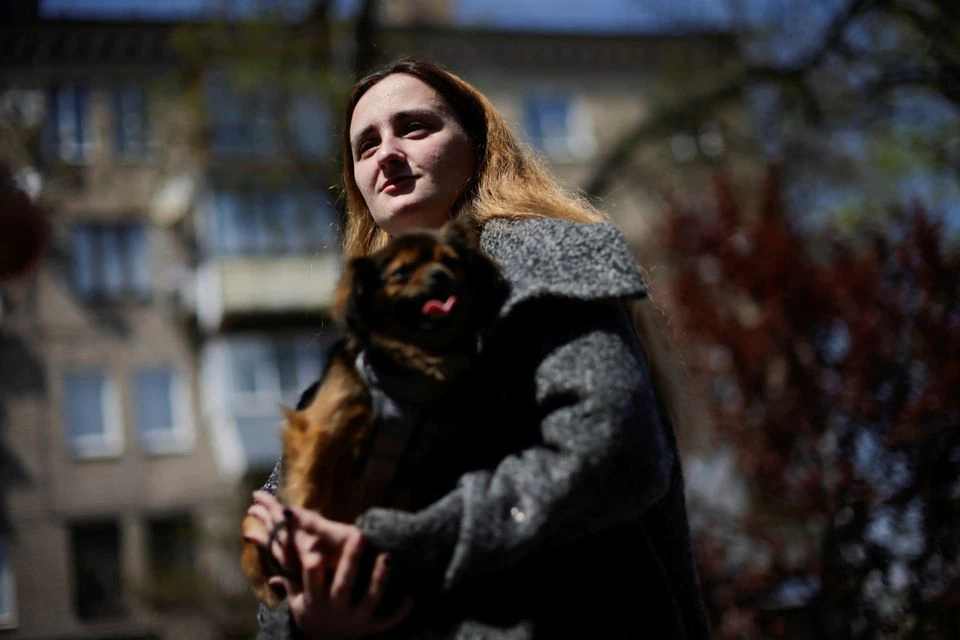
Tetyana Trotsak, a Mariupol evacuee, is feeling the sun on her face and looks up at the bright blue sky on her first day of freedom after two months in a bunker.
She can’t forget about the 42 people she believes are still trapped in a shelter they shared beneath Ukraine’s beleaguered Azovstal steelworks.
The 25-year-old, her husband, and their parents were among dozens of people who arrived in the Ukraine-controlled town of Zaporizhzhia on Tuesday after being evacuated from a plant in Russian-occupied Mariupol, where other residents and the city’s final defenders are still trapped.
Trotsak marvelled at the quiet street while holding her lapdog Daisy to her bosom.
‘Look at the sky – blue and bright sun – to escape and be beneath the tranquil sky. I believe we’re all getting sunburned because we’re deficient on vitamin D,’ after her first night above ground since early March, she stated on Wednesday.
‘However, I’m really concerned about the civilians and injured soldiers who remain.’
Only 14 of the 56 individuals in their bunker, including children, have been able to leave thus far, according to Trotsak.
Around 200 civilians and more than 30 children, according to city officials, are still trapped at the steel facility, which has been bombarded repeatedly by encircling Russian soldiers.
After a shell hit near their home, blasted up the doors, and ‘made everything tremble like jelly,’ Trotsak, who works for a local power company, said her family opted to seek sanctuary at Azovstal.
They moved into one of the plant’s shelters with a few things and some bedding, sharing food with other families and creating makeshift mattresses out of scraps of wood. She claimed that the chilly, damp circumstances caused things to become mouldy.
As the months of March passed, and the sounds of battle and explosions seemed to become closer, the gang began to lose hope that they would be able to return to their homes soon.
‘We could feel the shaking merely by sitting on the bed when the intense shelling started and powerful strikes started hitting near our shelter,’ Trotsak said, recounting frantic efforts to find a method to illuminate the pitch-black bunker after the bombings cut off power supply.
She kept composed when speaking about their tragedy, only breaking down when she recalled how her family had to ask a Ukrainian soldier to shoot their older dog Jerry, who was blind and suffering in the tiny shelter.
Trotsak claimed that the soldier took the dog away and then returned wailing.
Their only link to the outside world was a radio, and in April they heard tales of international efforts to assist Mariupol’s stranded population. ‘This gave us more strength,’ she added. ‘It felt like we might get out and it would all be done.’
However, when the evacuation day arrived, there were insufficient spaces to accommodate everyone. Because her mother suffers from asthma, Trotsak’s family was persuaded to join the first wave.
‘Go ahead, get to Zaporizhzhia, get a table at a cafe, and… we’ll join you for pizza,’ one of the people who stayed behind told her.
‘Of course, going first was really inconvenient for us.’
Three Ukrainian soldiers guided the group as they made their way through the ruins around the plant. The trek to the waiting buses, which should have taken 15 minutes, took two and a half hours due to the debris.
‘We noticed everything was blazing in black smoke the day before yesterday walking past the facility,” she claimed. ‘May God forbid that further shells land near the civilian bunkers.’
The port city, which had 400,000 residents before the war, has seen the most intense fighting so far in the conflict, which Moscow refers to as a ‘special military operation’ to disarm Ukraine and protect its Russian-speaking population from fascists.
Moscow’s accusation of fascism, according to Kyiv and its Western backers, is a bogus justification for an unjustified war of aggression that has forced more than five million Ukrainians to flee abroad.
Trotsak and her family are living in a hotel that has been commandeered to house evacuees, but Trotsak does not want to remain too long since she does not want to take up space for the many Mariupol evacuees she expects will come soon in the relative safety of Zaporizhzhia.
‘There are no explosions, which is a blessing. And I sincerely hope that there will never be any kind of booms here, other than fireworks and thunder.’

Post Your Comments